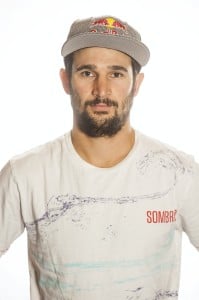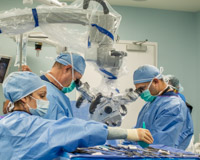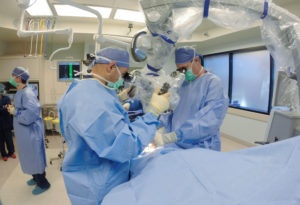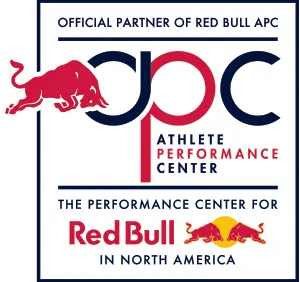By Sarah Sotoodeh
 Professional mountain biker Darren Berrecloth is not a cautious person by nature. He’s not reckless, rather, Berrecloth is fearless. Biking through difficult mountain terrain, flipping mid-air…it’s all in a day’s work for this Canadian daredevil. However, since undergoing spine surgery at DISC Sports & Spine Center in January, Berrecloth is off the bike and resting up during the recovery process. I spoke to him about his injury, his Canadian roots and the craziest trick he’s done in his career so far.
Professional mountain biker Darren Berrecloth is not a cautious person by nature. He’s not reckless, rather, Berrecloth is fearless. Biking through difficult mountain terrain, flipping mid-air…it’s all in a day’s work for this Canadian daredevil. However, since undergoing spine surgery at DISC Sports & Spine Center in January, Berrecloth is off the bike and resting up during the recovery process. I spoke to him about his injury, his Canadian roots and the craziest trick he’s done in his career so far.
Q: Talk about what happened with your back?
Berrecloth: Throughout the year of my season, I’ve had lots of impact and just generally being a really hard season on my back and a bunch of little micro injuries led to a bulging disc. I tried to heal it naturally by sitting around, basically laying out for three months and not doing anything. The pain didn’t subside and my bulge didn’t suck itself back in, so I came down beginning of January to see Dr. Bray and all the guys here at the DISC clinic. They did an MRI and realized that my bulge had actually gotten worse from three months prior, which determined that I needed to have back surgery, which is an L5-S1 microdiscetomy. The people here at DISC were super nice, really nicely treated here, it was super easy, really fun, mellow, probably one of the better clinics—definitely best clinic I’ve been at.
Berrecloth: Everyone was super friendly and the operation went amazing. The surgeon was actually really excited how the operation went, he said everything went as good as it could. I think I took like two pain pills afterwards, so obviously he did a really good job and I’ve been pain free ever since.
Q: How are you feeling right now?
Berrecloth: I feel great. Instant pain relief. I feel like I can go do stuff, but I know that’s not the case. I need to take it easy for another two months.
Q: What have you been doing while recovering?
Berrecloth: Just a little walking around. Going out to dinner, stuff like that, but nothing really yet I’m able to do, just because I have an open disc. They went in there and snipped the front of the disc off so you can’t really do much. I’m actually here to grill the surgeon on what I can and can’t do for the next couple of weeks just because my nature is to always push it.
Q: Have you had any injuries in the past?
Berrecloth: I’ve been professionally mountain biking for 10-12 years. I’ve had dozens of injuries over the years and this is definitely not the first time, and to be honest, this is the second time I had this surgery, so yeah I’m no stranger to injuries and what they entail.
Q: How did you get started in mountain biking?
Berrecloth: I got started riding bikes, just like any other kid. Having a bike, riding down the street—find a pile of dirt, start jumping off of it, jumps got bigger, started learning tricks and here I am.
Q: So you were never afraid when you were doing those types of tricks?
Berrecloth: It’s just like anything, you’re always scared but you can practice and you build yourself up, start small and sooner or later you’re there.
Q: What’s on your mind when you’re mid-air doing a trick?
Berrecloth: Generally when we’re doing any sport such as this, you’re pretty much just focused on doing what you need to do, you’re visualizing point A to point B, what you’re going to be doing in the middle of the air or the turn, corner or whatever it is—you’re just in the moment.
Q: Do you train here in Southern California?
Berrecloth: I’m from Canada and I mainly train up there. I come down here to visit from time to time to visit friends and what not.
Q: What part of Canada?
Berrecloth: Vancouver, British Columbia.
Q: I have to ask, are you a fan of hockey?
Berrecloth: Absolutely.
Q: I’m assuming…
Berrecloth: …I’m a Canucks fan.
Q: Unfortunately…No I’m kidding…
Berrecloth: They aren't doing very well at the moment.
Q: What do you do in your spare time?
Berrecloth: I pretty much do everything outdoors, snowboarding, skiing, snowmobiling, surfing, fishing, hunting, dirt biking, scuba diving and some other things.
Q: What’s coming up for you this year?
Berrecloth: There are always lots of movie projects and film projects coming around. Just looking forward to getting back on the bike and getting active again because I’ve been off pretty much been doing nothing for the last four months, because like I said, I was trying to heal this naturally, so at the end of this it will be seven, almost eight months off the bike, so it’s a long freaking time.
Q: Have you been on the bike since your injury?
Berrecloth: I went for a little ride but nothing really that gets my fix.
Q: So you’re heading back to Canada and you’re going to rest?
Berrecloth: Tomorrow…hang out, yup recover.
Q: What has been the craziest thing you’ve ever done on your bike?
Berrecloth: Well there’s lots of fun things I’ve done in my career but yeah one of the more memorable things is back at Crankworx in ’06 or ’07, 360ed a big road gap—never done a 360 on a gap like that—so it was kind of new for me so definitely memorable. It was definitely a fun one.
Q: What is it about the sport that makes you want to continue doing it?
Berrecloth: Generally the best thing about what I do is the absolute freedom. With mountain bikes you can go ride on any terrain, you can ride up a mountain, you can ride down a mountain and you can do skate park, you can do dirt jumps— it’s just so versatile of a toy. It’s pretty amazing what you can do on those bikes.
Q: When you get the ok from the doctors and you can go back on the bike, what’s the first thing you want to do?
Berrecloth: Go shred.

About the author
discmdgroup DISC Sports & Spine Center (DISC) is a national leader in minimally invasive spine surgery, orthopedic surgery, and sports medicine care. Our spine surgeons set the standard in artificial disc replacement, spine fusion, discectomy, microdiscectomy and the full spectrum of spine procedures. The group’s orthopedic surgeons advance the state of joint preservation surgery and total joint replacement, including total knee replacement as well as total hip replacement. Our flagship surgery centers based in Newport Beach, Marina del Rey, and Carlsbad serve patients local to Los Angeles, Orange County and San Diego, as well as the rest of the country. Read more articles by discmdgroup.





